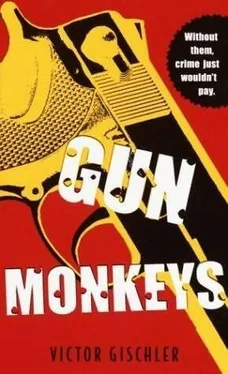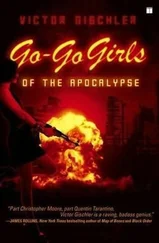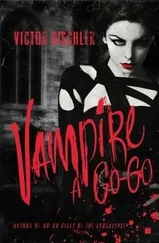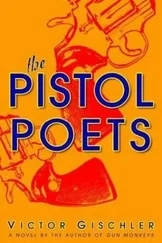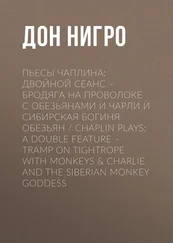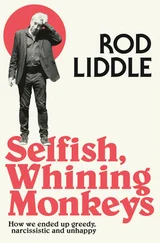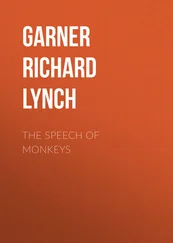It had been after one of these trips that Stan and I had pie for the second time.
I’d been sent to pull the plug on an assistant D.A. in St. Louis, but I’d been handed a bad scouting report. I walked into a room full of guns and had some trouble getting out in one piece. The bullet I’d taken in the belly had me out of action for three months. Before Stan would pass me okay for work we’d met for pie. He’d wanted to look me in the eye. To see if I could still handle it.
“We got to stick together,” Stan had said.
“I know.”
“If we can’t stand by each other,” Stan had told me, “the rest don’t mean shit. You remember that.”
“I’ll remember.”
The third time we’d had pie was after Thumbs Hogan took it in the back.
He’d been giving a delinquent gambler a knuckle job. The gambler was having a bad football season and was into Stan for ten grand. So Hogan had the gambler down on the gambler’s carpet in the gambler’s living room, breaking the gambler’s ribs when the gambler’s fourteen-year-old daughter screamed into the room, tears smearing down her face, yelling for Hogan to get off her daddy as she unloaded a.22 caliber pistol into Hogan’s back.
So two bites into my pie, Stan had told me I was in charge of the monkey cage. The new chain of command went from God to Stan to me to the boys. I wasn’t quite an executive, but I was more of a somebody than I’d been before. Congratulations.
The fourth time for pie had been six years later, just after Dad had died.
Now Stan had called and said it was time for pie again. Something was up. I said pie sounded like a good idea, but my gut twisted into a little knot.
I walked into Troy’s Diner just after three in the afternoon. I had my explanation all rehearsed and ready for when Stan asked about Sanchez. Self-defense all the way. Still, you didn’t retire one of Stan’s boys without Stan’s permission. It was a matter of etiquette.
The diner was full of unwashed college kids with too many tattoos and too much time on their hands. Stan wanted to meet someplace where nobody would see us. I spotted Stan in a back booth, sat across from him. The coffee and pie arrived a few seconds later, brought by a pale twenty-something waitress with black hair and black lipstick. Hot apple pie with a scoop of vanilla ice cream on top.
“Stan.”
He nodded to me. “Charlie.”
Stan had been in the South since before I was born, but he still retained his deep Bronx accent. He came south in 1955 with a pistol and an attitude. His voice sounded like a bag of rocks in a tumble dryer.
Stan had looked old even when I’d first known him. Now he sat shrunken inside his blue, pinstripe suit. His head was bald as a melon, dotted with dull brown liver spots. His face was a wad of sagging red flesh, but his bright blue eyes were hard and alert.
“Beggar Johnson’s in town tonight,” said Stan.
Beggar Johnson and Blade Sanchez had been tight. Sanchez had even gone as far as saying he was going to work for Beggar. I looked at my pie like it was the priority of my life. Inwardly, I braced myself.
Stan produced a rolled-up paper bag, slid it across the table to me. “Look inside.”
I looked.
The bag contained the metal receiver box for the hidden microphone we sometimes used, also the cordless earpiece and the tiny tape recorder. I looked in the bag again. I looked at Stan.
“Beggar and a couple of his men are coming up to meet me and mine,” said Stan. “I want you on the listening end.”
I blinked at him. “Why?”
He frowned. “Why? Because I say why is why.”
I nodded. “Sure, Stan.”
“Then stick around after,” he said. “I might have an errand for you. And keep this under your hat.”
“Sure. What am I listening for?”
“You’ll know when you hear it.” He stood and dropped a twenty on the table. “Wait a few minutes before you leave. See you tonight.”
He walked out. I sat. Drank coffee. The ice cream on my pie melted.
I thought about what Stan had said, but even more about what he didn’t say. The unhappy stink of change was on the wind. A big shake-up coming our way. I’d seen shake-ups before but never from inside the eye of the shitstorm itself. We didn’t help decide policy down in the monkey cage, so if Stan wanted me on my toes, then on my toes I’d be.
I signaled the waitress for more coffee, and while I was considering my soggy slice of pie, I realized Stan hadn’t even asked about Sanchez. No mention. Not a word.
Back in the day, a hot game for high stakes in the back room at O’Malley’s would have meant a dense layer of gray-blue smoke. Hard men keeping cigars alive with short, nervous puffs, ties pulled loose, pistols checked at the door, a line of hookers snapping gum at the bar waiting to reward winners, console losers.
But this ain’t back in the day.
The stakes aren’t so high, and smoke hurts my eyes. I wasn’t in charge of much, but I was sure as hell in charge of the monkey cage. You want to light a Lucky, take it out to the alley.
“That’s forty bucks,” said Bob Tate. He looked at Lou Morgan, and Lou looked back like Bob had just asked for a kidney.
“That’s steep.”
Bob shrugged. “In or out?”
Lou looked at me. “What do you think, Charlie?”
I sighed at him. Didn’t answer.
“I ain’t got forty, man,” said Lou.
“For Christ sake,” said Bob. “We just got paid yesterday. What the hell do you do with your money?”
“What about a loan?” That was Benny. Always trying to be helpful.
I said, “I’m getting bored here.”
And that settled it.
“Never mind then,” said Lou. “I’ll pass.”
I scooped the dice off the center of the board, rattled them in my fist, and rolled. Eleven. I scooted the race car around the big third turn, passed the cartoon policeman with the whistle in his mouth, left Park Place and Luxury Tax in the dust, and parked my car right next to Lou’s little tin dog.
“Son of a bitch,” said Lou.
I counted out forty bucks and passed it to Benny, who’d drawn duty as banker. A tenth of the normal price. That’s how we’d adapted the rules to use real money. Everything divided by ten. He gave me the white square of cardboard with the blue across the top. The deed for Boardwalk.
“We might as well cash it in,” said Bob. “He’s got the yellow ones and the green ones and now the blue ones.”
As far as Bob was concerned, nothing had a proper name. Everything was the blue one or the green one or the lumpy one or the wet one or the one that smelled like cheese. He’d been married nine years before his wife had caught him with her sister. When I asked which sister, he’d said, “The easy one.”
The door leading into O’Malley’s front room opened. Amber scooted through amid the crowd chatter. They had a basketball game on, and judging from the crowd’s surly tone, the Magic were taking another beating.
Amber had a paper sack in her hand. It bulged with money, which meant one of Stan’s mules had dropped off his weekly take. Amber scooted over to the floor safe behind the bar and dropped it in. On her way back out, she diverted toward the table, bent and gave me a quick peck on the cheek.
“Tell Danny I’ll call him tomorrow, would you, Charlie?”
“No problem, honey.” I beamed at her.
She turned on her high heels and swished back into O’Malley’s. Everyone at the table watched her go.
Amber and my kid brother Danny had a pretty steady thing going. They’d been dating about a year, and I was pretty sure Danny was ready to pop the question any second now. But you could see in Amber’s eyes she had a lot of living yet to do. She was just twenty years old and working on her degree in theater arts at UCF. A pretty kid with her head in the clouds.
Читать дальше
